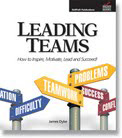I often tell teams—
- Ya gotta learn how to talk;
- Ya gotta learn how to fight; and
- Ya gotta learn how to work together.
These are the essential team skills.
Now… here is one of the eye-opening truths about effective team dynamics:
You don’t have to LIKE each other to become an effective team—you just have to learn how to WORK together.
One of the myths of effective teams is that they are effective because team members like each other and have formed friendships with one another. The reality is actually the opposite! Research has shown that effective teams learn how to succeed as a team, and as a result, they feel good about themselves and their relationships as team members. In other words, COMPETENCE precedes CAMARADERIE!
Expert J. Richard Hackman [the Edgar Pierce Professor of Social and Organizational Psychology at Harvard University] gives the illustration of exceptional symphony orchestras—which are loaded with musical egos and prima Donna mindsets. Studies show that these teams develop a better sense of team identity when they are led to exceptional performances under the able direction of a skilled conductor. The walls between musicians dissolve AS A RESULT of an effective performance, not the other way around!
This may sound counter-intuitive until you understand the definition of a professional:
A PROFESSIONAL is an individual who is able to set aside personal bias, prejudice, or selfish interest in order to focus their energies and abilities on the work they are tasked to do.
Effective teams succeed because individual team members are able to do just that—to set aside their egos and their personal agendas in order to focus on the success of the team as a whole.
Here is how I express this to my clients:
NOBODY wins until the TEAM wins!
Any individual team member may be the best in their field, but if the team fails, that team member’s expertise counts for nothing! The clearest example is a professional sports team. The team may be composed of many talented, high-performing, and highly-paid individuals. But we all know that the ultimate measure of success for a team is NOT the individual performance of each team member…the ultimate measure of success is if THE TEAM WINS.
Once again, this is where your team VISION and VALUES are essential—they must be clear, and supported by every team member. Your team vision and values constitute your Team Charter. If you do not have a Team Charter, you are already missing an essential ingredient to team success!
I spent a whole chapter on team vision statements in my book, Leading Teams. In that chapter, I listed the four main ingredients to a clear team vision statement:
- What we do
- Who we do it for
- How well we intend to do it
- The measurable results we will achieve
Get a copy of my book for more details about effective team leadership—I highly recommend it! P.S. You can get a copy for a song on Amazon! Here’s the link: Leading Teams: How to Inspire, Motivate, Lead, and Succeed!: James Dyke: 9781934589007: Amazon.com: Books
Clear Team Vision is essential, but effective teams don’t just have clear VISION—they also have clear VALUES that are supported by specific SKILLS.
In a 2019 article in Harvard Business Review, researcher Francesca Gino identified the collaborative SKILLS that underscore the important VALUES of high-performing teams and organizations. She discovered that many organizations embrace collaborative values, but fail to build a collaborative culture. Here’s what she concluded:
One problem is that leaders think about collaboration too narrowly: as a value to cultivate but not a skill to teach.
By studying highly collaborative organizations like Pixar and Webco, she identified key training practices that enable both leaders and employees to work well together; learn from one another; and overcome the psychological barriers that get in the way of doing both. These skill-producing efforts help people connect and collaborate more effectively and consistently. And as you might imagine, her research reinforces what I have already been telling you: that COMMUNICATION is the #1 skill that teams need, in order to be effective. You will see this, as we review her list of essential skills! You will also see elements of my #2 skill in her list, in the arena of CONFLICT RESOLUTION.
Here is her list…
1. Teach People to Listen, Not Talk
Yep…what I’ve been teaching leaders for years—the value of effective listening skills. Again, this is definitely in the COMMUNICATION category! Gino adds the following supportive practices in this area: exercise curiosity instead of judgment; ask questions; tune in to the speaker; monitor your own bad listening habits; and…get comfortable with silence.
2. Train People to Practice Empathy
Empathy is the ability to understand another person’s point-of-view. (Remember in the last post what I teach my people: We must all agree that our Number One Goal is to gain better understanding!!!)
Gino reminds us:
Being receptive to the views of someone we disagree with is no easy task, but when we approach the situation with a desire to understand our differences, we get a better outcome.
How do we do that? It helps if each person involved assumes that everyone else contributing to the discussion is smart, caring, generous, and fully invested in a productive outcome.
3. Make People More Comfortable with Feedback
Good collaboration involves giving and receiving feedback well—and from a variety of directions—up, down, and especially sideways between fellow team members. Read the first installment in this series to review my use of the tool, Continue / Stop / Start –a practical way to introduce your team to the important skill of feedback in the COMMUNICATION arena!
Gino gives tips on how to make feedback an effective practice—by talking openly about the potential discomfort of giving and receiving feedback; by coaching team members on how to give feedback effectively; and by identifying helpful feedback as behaviorally-based, specific, direct, and helpful to the collaborative process.
4. Teach People to Lead and Follow
If “leading” means “taking initiative” and “directing,” then “following” has equal value when it means that others respond constructively by “stepping back to allow others to step forward,” “hearing from others in the group,” and “taking direction from others when appropriate.”
5. Speak with Clarity and Avoid Abstractions
Again, Gino is identifying another key element of COMMUNICATION. So…How do you know if you have “spoken with clarity?” How do you make sure you have communicated your thoughts CLEARLY without confusion or obfuscation??? It’s simple…ASK YOUR LISTENER THIS QUESTION:
What did you hear me say?
Their answer will immediately surface any miscommunication on YOUR part or misunderstanding on THEIRS.
BTW…The more feedback you get on your practice of communication, the better you will get at sharing information and ideas. It’s just that simple!
6. Train People to Have Win-Win Interactions
We all want these. Getting them EVERY TIME, however, is unrealistic… UNLESS you redefine “win-win.” I teach my teams to focus on what is best for the team. Remember what I said:
NOBODY wins until the TEAM wins.
So… whenever two team members are in conflict, it’s important for them to have some sense of what will best enable the team as a whole to perform in the best way possible, to achieve the TEAM vision TOGETHER. It’s important for everyone on the team to embrace TEAM success as the ULTIMATE FORM OF “WINNING.”
IN ORDER TO FOCUS ON WIN-WIN INTERACTIONS, everyone involved needs a clear understanding of each party’s point-of-view. That requires an honest sharing of each other’s needs. Gino put it this way,
In the successful collaborative projects I examined, people were open about their personal interests and how they thought they could contribute to solving the problem. Such transparency allows participants to explore everyone’s vision of winning and, ultimately, get more-favorable results.
So… how “collaborative” is YOUR team? Do they know how to work with one another… TOGETHER?? Or do you still see a breakdown of team cohesion and the resulting loss of productivity and performance?
Call us if your team needs help to become a more dynamic, collaborative group. We have helped thousands of team leaders, equipping them with practical tools to help their people work together more effectively. And we can help you, too!
Until next time… Yours for better leaders and better organizations,
Dr. Jim Dyke – “The Boss Doctor” ™ helping you to BE a better boss and to HAVE a better boss!






